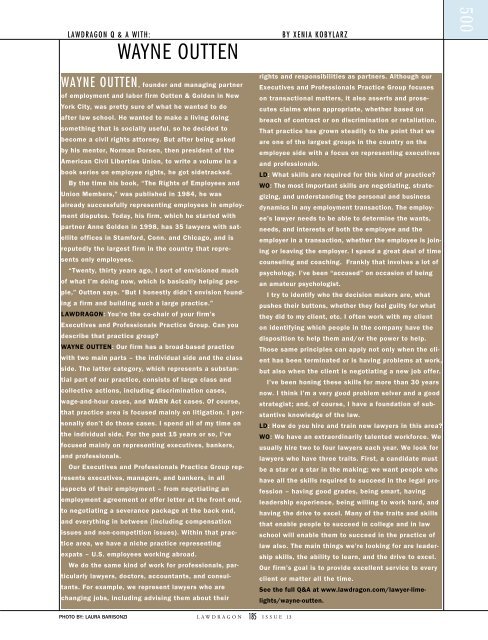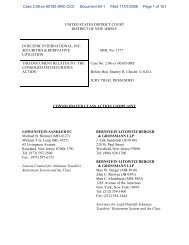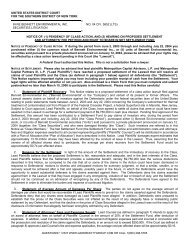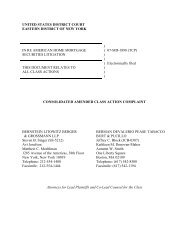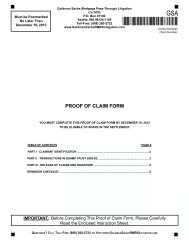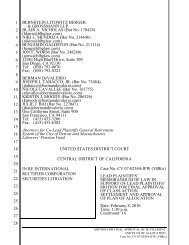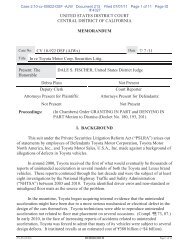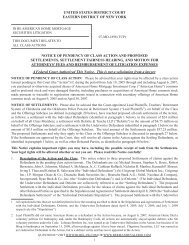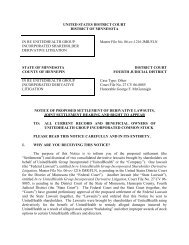to view the Lawdragon's - Bernstein Litowitz Berger & Grossmann LLP
to view the Lawdragon's - Bernstein Litowitz Berger & Grossmann LLP
to view the Lawdragon's - Bernstein Litowitz Berger & Grossmann LLP
Create successful ePaper yourself
Turn your PDF publications into a flip-book with our unique Google optimized e-Paper software.
Lawdragon Q & A with:Wayne OuttenWayne Outten, founder and managing partnerof employment and labor firm Outten & Golden in NewYork City, was pretty sure of what he wanted <strong>to</strong> doafter law school. He wanted <strong>to</strong> make a living doingsomething that is socially useful, so he decided <strong>to</strong>become a civil rights at<strong>to</strong>rney. But after being askedby his men<strong>to</strong>r, Norman Dorsen, <strong>the</strong>n president of <strong>the</strong>American Civil Liberties Union, <strong>to</strong> write a volume in abook series on employee rights, he got sidetracked.By <strong>the</strong> time his book, “The Rights of Employees andUnion Members,” was published in 1984, he wasalready successfully representing employees in employmentdisputes. Today, his firm, which he started withpartner Anne Golden in 1998, has 35 lawyers with satelliteoffices in Stamford, Conn. and Chicago, and isreputedly <strong>the</strong> largest firm in <strong>the</strong> country that representsonly employees.“Twenty, thirty years ago, I sort of envisioned muchof what I’m doing now, which is basically helping people,”Outten says. “But I honestly didn’t envision foundinga firm and building such a large practice.”LAWDRAGon: You’re <strong>the</strong> co-chair of your firm’sExecutives and Professionals Practice Group. Can youdescribe that practice group?WAYne OuTTEn: Our firm has a broad-based practicewith two main parts – <strong>the</strong> individual side and <strong>the</strong> classside. The latter category, which represents a substantialpart of our practice, consists of large class andcollective actions, including discrimination cases,wage-and-hour cases, and WARN Act cases. Of course,that practice area is focused mainly on litigation. I personallydon’t do those cases. I spend all of my time on<strong>the</strong> individual side. For <strong>the</strong> past 15 years or so, I’vefocused mainly on representing executives, bankers,and professionals.Our Executives and Professionals Practice Group representsexecutives, managers, and bankers, in allaspects of <strong>the</strong>ir employment – from negotiating anemployment agreement or offer letter at <strong>the</strong> front end,<strong>to</strong> negotiating a severance package at <strong>the</strong> back end,and everything in between (including compensationissues and non-competition issues). Within that practicearea, we have a niche practice representingexpats – U.S. employees working abroad.We do <strong>the</strong> same kind of work for professionals, particularlylawyers, doc<strong>to</strong>rs, accountants, and consultants.For example, we represent lawyers who arechanging jobs, including advising <strong>the</strong>m about <strong>the</strong>irbY Xenia Kobylarzrights and responsibilities as partners. Although ourExecutives and Professionals Practice Group focuseson transactional matters, it also asserts and prosecutesclaims when appropriate, whe<strong>the</strong>r based onbreach of contract or on discrimination or retaliation.That practice has grown steadily <strong>to</strong> <strong>the</strong> point that weare one of <strong>the</strong> largest groups in <strong>the</strong> country on <strong>the</strong>employee side with a focus on representing executivesand professionals.LD: What skills are required for this kind of practice?WO: The most important skills are negotiating, strategizing,and understanding <strong>the</strong> personal and businessdynamics in any employment transaction. The employee’slawyer needs <strong>to</strong> be able <strong>to</strong> determine <strong>the</strong> wants,needs, and interests of both <strong>the</strong> employee and <strong>the</strong>employer in a transaction, whe<strong>the</strong>r <strong>the</strong> employee is joiningor leaving <strong>the</strong> employer. I spend a great deal of timecounseling and coaching. Frankly that involves a lot ofpsychology. I’ve been “accused” on occasion of beingan amateur psychologist.I try <strong>to</strong> identify who <strong>the</strong> decision makers are, whatpushes <strong>the</strong>ir but<strong>to</strong>ns, whe<strong>the</strong>r <strong>the</strong>y feel guilty for what<strong>the</strong>y did <strong>to</strong> my client, etc. I often work with my clien<strong>to</strong>n identifying which people in <strong>the</strong> company have <strong>the</strong>disposition <strong>to</strong> help <strong>the</strong>m and/or <strong>the</strong> power <strong>to</strong> help.Those same principles can apply not only when <strong>the</strong> clienthas been terminated or is having problems at work,but also when <strong>the</strong> client is negotiating a new job offer.I’ve been honing <strong>the</strong>se skills for more than 30 yearsnow. I think I’m a very good problem solver and a goodstrategist; and, of course, I have a foundation of substantiveknowledge of <strong>the</strong> law.LD: How do you hire and train new lawyers in this area?WO: We have an extraordinarily talented workforce. Weusually hire two <strong>to</strong> four lawyers each year. We look forlawyers who have three traits. First, a candidate mustbe a star or a star in <strong>the</strong> making; we want people whohave all <strong>the</strong> skills required <strong>to</strong> succeed in <strong>the</strong> legal profession– having good grades, being smart, havingleadership experience, being willing <strong>to</strong> work hard, andhaving <strong>the</strong> drive <strong>to</strong> excel. Many of <strong>the</strong> traits and skillsthat enable people <strong>to</strong> succeed in college and in lawschool will enable <strong>the</strong>m <strong>to</strong> succeed in <strong>the</strong> practice oflaw also. The main things we’re looking for are leadershipskills, <strong>the</strong> ability <strong>to</strong> learn, and <strong>the</strong> drive <strong>to</strong> excel.Our firm’s goal is <strong>to</strong> provide excellent service <strong>to</strong> everyclient or matter all <strong>the</strong> time.See <strong>the</strong> full Q&A at www.lawdragon.com/lawyer-limelights/wayne-outten.500Pho<strong>to</strong> by: Laura BarisonziL A W D R A G O N 185 I s s u e 13


